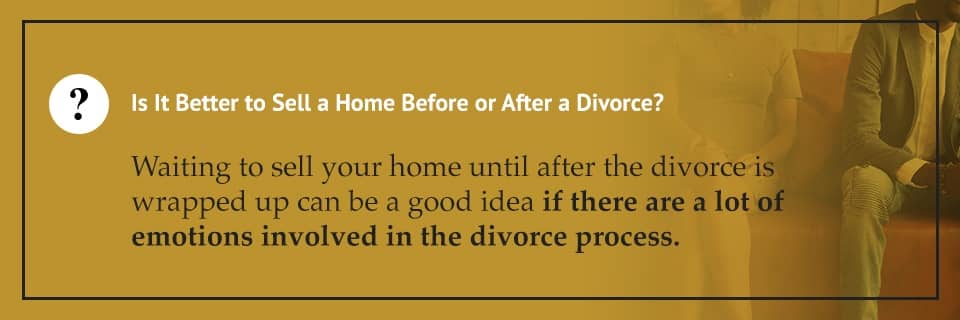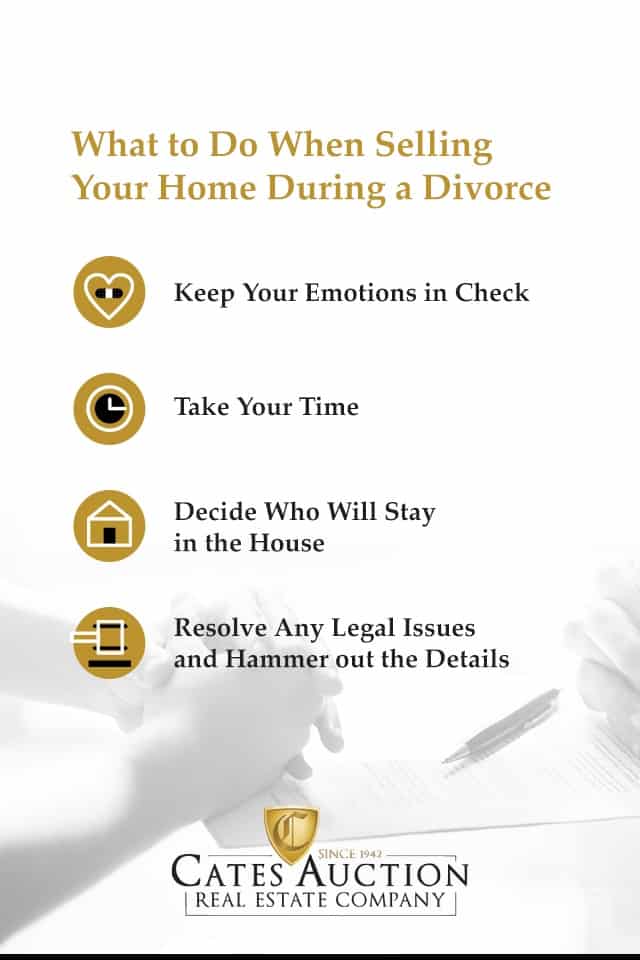
Up to 50% of marriages end in divorce, so if you’re going through a divorce right now, you have company. As you go through a divorce, you’re likely to find that some issues are more pressing and vital than others. You and your soon-to-be-ex need to discuss how you’ll manage childcare and custody after the split. If you own property together, such as a house, you’ll also need to decide what to do with it. Depending on your financial situation, one partner might keep the house after the divorce, or you might choose to sell the home and divide the proceeds from the sale.
If you decide to sell your home during a divorce, there are some questions you need to answer. Is selling the house first or going through the divorce first the better option? How will selling your house as a result of divorce affect your taxes? Finally, can your former spouse force the sale of your house during a divorce? Learn more about what you can expect as you sell your property as part of the process of getting divorced.
Is It Better to Sell a Home Before or After a Divorce?

There are pros and cons of selling your house before your divorce is finalized. There are also pros and cons of hanging on to the house and selling it after the divorce. Perhaps the biggest benefit of selling the home before your divorce is over is doing so gives you and your former spouse a chance to start completely fresh. Neither of you will continue to live in a home that is likely full of memories, both good and bad. Depending on the market conditions, how much you still owe on the mortgage and the value of your house, you might both walk away with a significant amount of money to use to start your new lives.
Taxes are another reason why you might prefer to sell your home before your divorce. If you make money on the sale of your home, up to $250,000 of the gain is exempt from capital gains tax if you’re single. If you sell the house while still legally married, the exemption is $500,000. To qualify for the exemption, you need to live in the home for at least two out of the past five years. If you move out of the house and it takes your ex-spouse years to sell, you might not qualify for the exemption by the time of the sale.
Waiting to sell your home until after the divorce is wrapped up can be a good idea if there are a lot of emotions involved in the divorce process. If you’d rather not talk to your soon-to-be-ex or if you have difficulty agreeing, it can be challenging to sell your house. Although you might not want to be friends with your ex, time can heal many wounds. A few months or even a year after your divorce, you and your ex might feel ready to come together and draft a plan to sell the house. Depending on the market in your area, waiting to sell until after your divorce can mean that the home’s value has time to increase, so you both end up walking away with more money in your pockets.
Can You Be Forced to Sell Your House in a Divorce?
It might be the case that you want to hang on to the house, and your ex wants to sell it during or after your divorce. Can you be forced to sell, even if you don’t want to? It depends on the particular circumstances of your divorce and the rules of your state. It might be the case that you have enough money to buy the house from your ex, or that the way your joint property gets divided up allows you to keep the house while your spouse gets other assets. If the house still has a mortgage on it, you’ll most likely need to refinance the loan so that it’s in your name only.
What to Do When Selling Your Home During a Divorce

Once you and your almost-former spouse have decided to sell your house, there are some things you can do to make the process somewhat easier and to help potentially move the sale along. Although the last thing you might want to do at this time is to be friendly to your ex and work together, doing so will be in the best interest of both of you and the sale of your home.
Keep Your Emotions in Check
Emotions are high and tense at the end of any relationship. As you go through your divorce, it’s essential to keep your feelings separate from any financial transactions, at least as much as possible. Even if you don’t want to sell the house, you want to remember that doing so is most likely for the best. You can take the money you get from the sale and make a down payment on a new property just for yourself or use the money you get to start renting another home. No matter how much you like your old home, hanging on to it after a divorce may not be in the cards.
It’s also essential that you and your ex put away any differences or pettiness as you go through the divorce and sale of the house. You don’t want disagreements that have nothing to do with the house to interfere with the settlement or sale. Remember that, in a few years, you’ll look back on your divorce and the sale of your home and see things differently.
Take Your Time
Maybe you’re on the other side of things, and you can’t wait to sell the house and move on with your life. The sooner your divorce and everything that’s connected to it is over, the better. While it’s good to want to move onward and upward, it’s also good to take your time with the process and to make sure you’re doing everything right.
It’s usually a good idea to find a team of professionals to work with you throughout the divorce and the sale of your home. If possible, find a real estate professional who has experience working with divorcing couples. The process of working with a couple who is splitting is somewhat different from the process of working with a married couple or a single buyer. Your agent should be on top of things and ready to repeat information or at least share information with each party individually, rather than assume that a message will travel from one seller to the other.
While your spouse might be the last person you want to talk to or negotiate with at the moment, it’s a good idea to agree to work through the process together, slowly. Don’t make snap decisions when it comes to the listing price or to the offer you accept just because you want things to be over and done.
Decide Who Will Stay in the House
When you’re putting your house on the market, it might seem like a good idea for both of you to move out, leaving the house empty. But an empty house might be harder to sell, as buyers might struggle to see how to live in the rooms. In many cases, it’s a good idea for one of you to remain in the home until the sale is over. Having one person stay in the house can also be a good move financially. If you both move out, you end up paying two additional rents or mortgages, plus the mortgage on the house you’re selling.
If you’re the one who’s moving first, there are some things to consider. When you move out, assume that you won’t be returning to the house and take anything you want or need. You and your spouse will likely have to work together to decide what furniture and belongings you can take and what ones you’ll leave behind before one of you moves.
Resolve Any Legal Issues and Hammer out the Details
Double-check the details before you list the house and before a sale goes through. It’s a good idea to confirm that both you and your spouse are listed on the deed and to verify that there aren’t any liens or claims on the property, which can get in the way of a sale. The spouse who is moving out of the house might also want to make copies of any financial paperwork, such as tax returns, bank statements and credit card statements before they leave.
At this point, you and your spouse might want to sit down and hammer out an agreement about the sale of the house. Working with a real estate agent or another neutral third party, decide what the lowest acceptable sale price is that you’ll accept and who will handle what when it comes to the sale of the home. If one spouse is moving out of the state or relatively far away, they might decide to give their agent power of attorney to act on their behalf throughout the process or during the settlement.
Preparing Your House for Sale
Before the sale, your house might need some attention and fixing up. Small details such as a new coat of paint, refreshed fixtures in the kitchen and bathroom and a few potted plants on the front porch can go along way when it comes to convincing buyers to put in an offer. It’s a good idea to work with a real estate agent or another professional and have them handle the details of fixing up the house, especially if it’s difficult for you and your spouse to agree on anything.
You’ll also have to decide who is going to pay for repairs on the house or staging. If both of you have decided to move out, it can make sense to split the cost of staging the house equally. If one person is still in the home, they might be willing to pay for staging or to attempt to stage the house on their own to make it stand out to buyers.
How to Sell Your House During a Divorce

Once you’ve decided to fix up and prepare the home, the next step is to go through the process of actually selling the property. One of the first things to consider is how you’ll sell the house. Do you want to list it traditionally, so that potential buyers can come and view the house on their own time, or would you prefer to sell the house at auction? If both you and your spouse would rather sell the house as quickly as possible, so you can move on with your lives, an auction might be the way to go. When you sell through an auction, you sell the house “as-is,” so there’s no contingency period and no need for negotiations with the buyer about fixing up certain aspects of the property.
Whether you decide to sell through a traditional listing or an auction, you do need to set a price for the home. You want to choose a price that will help the home sell quickly, but not one that is so low that you’re leaving money on the table. A real estate professional can be a great asset when it comes to choosing a listing price for your home. They can look at comparable home sales in the area and give you an idea of what the best price might be.
What to Tell Potential Buyers of Your Home
People are usually curious about the reasons why a couple might be selling their home, so don’t be surprised if you get asked about the reason for the sale. Since you don’t want to give potential buyers the impression that you’re in a jam or that you want to sell the house as soon as possible and will accept a lowball offer, your best option is to say that you’re downsizing or moving to a house that better meets your needs. There’s no reason to mention the divorce.
Dividing the Profit From the Sale
When the house does sell, you and your ex will get to divide up any profits from the sale, once the remaining mortgage and expenses have been paid. How you divvy up the proceeds depends on a few factors. For example, you might decide that the easiest option is to split the profits 50/50. If one spouse lived in the house and paid the mortgage on their own from the time of the separation to the time of the sale, you might take that under consideration when deciding how to divide up the profit. Working with a divorce mediator or the courts can help you find the best way to split the proceeds.
An Auction Is a Great Option When Selling Your House After a Divorce Agreement

During and after a divorce, you’re most likely looking to move on with your life as quickly as possible. Selling the home you own with your ex quickly can help you get a fresh start. Compared to the traditional method of selling a home, real estate auctions are efficient and straightforward. If you want to complete the sale and move on as soon as possible, an auction can be the right option for you. Auctions are time-bound, expose your property to plenty of interested and qualified buyers and eliminate the inspections and contingency process.
Cate’s Auction & Realty Company has been helping sellers in Missouri and Kansas sell their homes through auction since 1942. Our team of real estate professionals will work with you to make sure your home is appropriately priced and to help move the sale along. To learn more about how we can help you sell a house during or after a divorce, schedule a free property analysis today.

